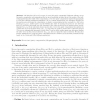Free Online Productivity Tools
i2Speak
i2Symbol
i2OCR
iTex2Img
iWeb2Print
iWeb2Shot
i2Type
iPdf2Split
iPdf2Merge
i2Bopomofo
i2Arabic
i2Style
i2Image
i2PDF
iLatex2Rtf
Sci2ools
117
Voted
STOC
2005
ACM
2005
ACM
Covert two-party computation
We introduce the novel concept of covert two-party computation. Whereas ordinary secure two-party computation only guarantees that no more knowledge is leaked about the inputs of the individual parties than the result of the computation, covert two-party computation employs steganography to yield the following additional guarantees: (A) no outside eavesdropper can determine whether the two parties are performing the computation or simply communicating as they normally do; (B) before learning f(xA, xB), neither party can tell whether the other is running the protocol; (C) after the protocol concludes, each party can only determine if the other ran the protocol insofar as they can distinguish f(xA, xB) from uniformly chosen random bits. Covert two-party computation thus allows the construction of protocols that return f(xA, xB) only when it equals a certain value of interest (such as "Yes, we are romantically interested in each other") but for which neither party can determine ...
Algorithms | Computation Employs Steganography | Covert Two-party Computation | Decisional Diffie-Hellman Assumption | STOC 2005 |
Related Content
| Added | 03 Dec 2009 |
| Updated | 03 Dec 2009 |
| Type | Conference |
| Year | 2005 |
| Where | STOC |
| Authors | Luis von Ahn, Nicholas J. Hopper, John Langford |
Comments (0)

